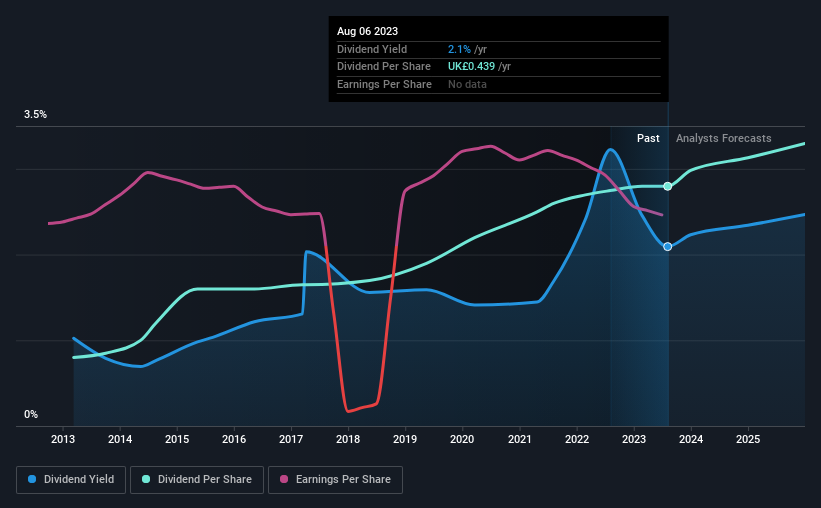Is It Worth Considering Hikma Pharmaceuticals PLC (LON:HIK) For Its Upcoming Dividend?
Readers hoping to buy Hikma Pharmaceuticals PLC (LON:HIK) for its dividend will need to make their move shortly, as the stock is about to trade ex-dividend. The ex-dividend date is one business day before the record date, which is the cut-off date for shareholders to be present on the company's books to be eligible for a dividend payment. The ex-dividend date is important as the process of settlement involves two full business days. So if you miss that date, you would not show up on the company's books on the record date. In other words, investors can purchase Hikma Pharmaceuticals' shares before the 10th of August in order to be eligible for the dividend, which will be paid on the 15th of September.
The company's next dividend payment will be US$0.25 per share, on the back of last year when the company paid a total of US$0.56 to shareholders. Based on the last year's worth of payments, Hikma Pharmaceuticals has a trailing yield of 2.1% on the current stock price of £21. We love seeing companies pay a dividend, but it's also important to be sure that laying the golden eggs isn't going to kill our golden goose! We need to see whether the dividend is covered by earnings and if it's growing.
See our latest analysis for Hikma Pharmaceuticals
Dividends are usually paid out of company profits, so if a company pays out more than it earned then its dividend is usually at greater risk of being cut. Last year Hikma Pharmaceuticals paid out 94% of its profits as dividends to shareholders, suggesting the dividend is not well covered by earnings. That said, even highly profitable companies sometimes might not generate enough cash to pay the dividend, which is why we should always check if the dividend is covered by cash flow. Thankfully its dividend payments took up just 33% of the free cash flow it generated, which is a comfortable payout ratio.
It's good to see that while Hikma Pharmaceuticals's dividends were not well covered by profits, at least they are affordable from a cash perspective. Still, if this were to happen repeatedly, we'd be concerned about whether the dividend is sustainable in a downturn.
Click here to see the company's payout ratio, plus analyst estimates of its future dividends.
Have Earnings And Dividends Been Growing?
Stocks in companies that generate sustainable earnings growth often make the best dividend prospects, as it is easier to lift the dividend when earnings are rising. If earnings fall far enough, the company could be forced to cut its dividend. For this reason, we're glad to see Hikma Pharmaceuticals's earnings per share have risen 16% per annum over the last five years.
Many investors will assess a company's dividend performance by evaluating how much the dividend payments have changed over time. Since the start of our data, 10 years ago, Hikma Pharmaceuticals has lifted its dividend by approximately 13% a year on average. It's exciting to see that both earnings and dividends per share have grown rapidly over the past few years.
The Bottom Line
Should investors buy Hikma Pharmaceuticals for the upcoming dividend? Earnings per share have been rising nicely although, even though its cashflow payout ratio is low, we question why Hikma Pharmaceuticals is paying out so much of its profit. Overall, it's hard to get excited about Hikma Pharmaceuticals from a dividend perspective.
So while Hikma Pharmaceuticals looks good from a dividend perspective, it's always worthwhile being up to date with the risks involved in this stock. Every company has risks, and we've spotted 3 warning signs for Hikma Pharmaceuticals you should know about.
Generally, we wouldn't recommend just buying the first dividend stock you see. Here's a curated list of interesting stocks that are strong dividend payers.
Have feedback on this article? Concerned about the content? Get in touch with us directly. Alternatively, email editorial-team (at) simplywallst.com.
This article by Simply Wall St is general in nature. We provide commentary based on historical data and analyst forecasts only using an unbiased methodology and our articles are not intended to be financial advice. It does not constitute a recommendation to buy or sell any stock, and does not take account of your objectives, or your financial situation. We aim to bring you long-term focused analysis driven by fundamental data. Note that our analysis may not factor in the latest price-sensitive company announcements or qualitative material. Simply Wall St has no position in any stocks mentioned.

